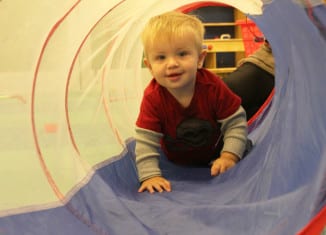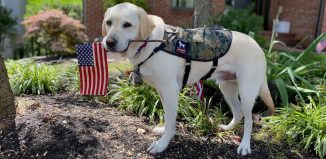Not just play time
Middle Country Public Library’s toddler program is copied throughout the country

A large room full of blocks, puppets, arts and crafts, instruments and more than a dozen lively toddlers seems more like a room in a nursery school than a library, but it is exactly how Middle Country Public Library Director Sandy Feinberg wanted the room to be.
The room is home to the library’s Parent-Child Workshop, a five-week program that provides an opportunity for young children to play with each other and their parents, and for the parents to connect with each other and learn about community resources.
It has been more than three decades since Feinberg first developed the program, which emphasizes the role of parents as the primary teachers in a child’s life. The program became the Family Place Libraries initiative in 1996, keeping the Parent-Child Workshop as one of its core components. Today, more than 300 libraries in 24 states offer Family Place Library programs and that number is continuing to grow, as 28 more libraries will soon implement the program thanks to a $450,000 grant MCPL received from the Institute of Museum and Library Services, an independent government agency.
Feinberg said that winning such a prestigious grant was an honor.
“It’s really an acclimation of my work and our work here,” she said.
Feinberg said that when she first developed the program in 1979, toddlers weren’t welcome in libraries.
“At the time there were no toys in the library,” she recalled.
But after having a child of her own and becoming immersed in parenting, she realized the positive impact libraries could have on the community if they focused on parents and caregivers.
To become a Family Place Library, libraries must complete three phases. First, librarians from all over the country attend a three-day Family Place Training Institute at Middle Country Public Library and complete seven hours of online training. Next, they go back to their libraries to implement the program within one year of the training. Lastly, evaluators visit those libraries and answer questions.
“It changes the focus of the children’s librarian to integrate toddlers and parents,” Feinberg said. “It broadens their perception of themselves [and] who they can reach.”
Kathleen Deerr, the national coordinator for Family Place Libraries, said that the program works well in all communities and helps parents engage their children in developmentally appropriate activities.
“Parents need to love first of all, and talk, play, sing and share books with their kids,” she said.
Anthony Smith, a senior grant program officer with the Institute of Museum and Library Services, said that the IMLS is always looking to support libraries and museums that serve as community anchors. The IMLS has awarded more than $2.5 million in grants this year.
“There really is strong emphasis with funding projects that demonstrate libraries and museums are working collaboratively with other community organizations,” Smith said.
Feinberg said that the role of libraries is changing and it is a goal for them to become more of a community education center. She said that she believes the IMLS grant can prove how Family Place programming can impact the entire library. Deerr agreed, stating how a library’s mission is to support lifelong learning — from cradle to grave.
“Young children learn through good relationships,” Deerr said. “[The program] helps [parents] bond with that child. That is going to really help strengthen the initial relationships that are really at the core of learning.”






